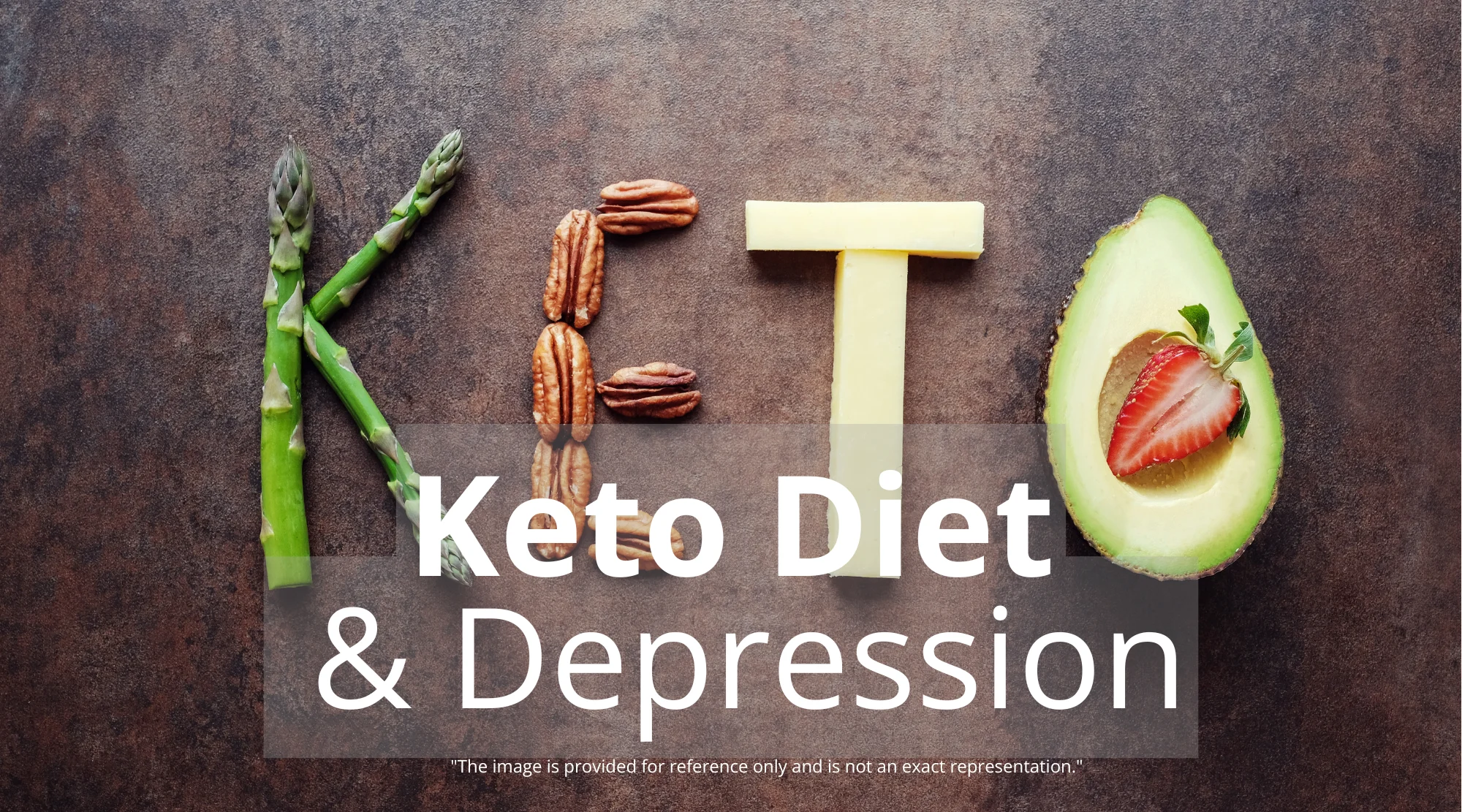Keto Diet and Depression: A Potential Lifeline for Mental Health
The link between diet and mental health is becoming increasingly clear, and a growing body of research suggests that the keto diet could be a powerful tool in managing depression symptoms. This article delves into the emerging science behind this fascinating connection, exploring how the ketogenic diet might offer a new avenue for those seeking relief from the often-debilitating effects of depression.

Understanding the Ketogenic Diet: A Primer
The ketogenic diet, often called the keto diet, is a high-fat, very-low-carbohydrate eating plan. Its primary goal is to shift the body’s metabolism into a state called ketosis. In ketosis, the body begins to use fat as its primary fuel source, instead of glucose derived from carbohydrates. This metabolic shift produces ketones, which the body can use for energy. The keto diet typically involves restricting carbohydrates to around 20-50 grams per day, while increasing fat intake significantly. This can mean consuming foods like avocados, nuts, olive oil, and fatty cuts of meat, while limiting or avoiding grains, sugars, and starchy vegetables. It’s important to note that the keto diet requires careful planning and often, guidance from a healthcare professional or registered dietitian, to ensure adequate nutrient intake and avoid potential side effects.
The Keto Diet and Depression: Emerging Evidence
Recent studies, including one involving college students, have shown promising results regarding the keto diet and depression. These studies suggest that the diet may lead to a significant reduction in depressive symptoms. In some cases, the improvement has been dramatic, with participants experiencing a noticeable boost in their mental well-being within a relatively short timeframe. The potential for weight loss, which often accompanies the keto diet, may also contribute to improved mental health, as weight management has been linked to better mood and cognitive function.
How the Keto Diet Might Benefit Mental Health
The exact mechanisms by which the keto diet affects mood and mental health are still being investigated, but several theories are gaining traction:
- Ketones as Brain Fuel: The brain can use ketones as an alternative fuel source when glucose is scarce. Ketones may be a more efficient fuel source for the brain, potentially improving cognitive function and overall brain health.
- Neuroinflammation Reduction: Chronic inflammation is increasingly recognized as a factor in depression. The keto diet may have anti-inflammatory effects, potentially reducing inflammation in the brain and alleviating depressive symptoms.
- Neurotransmitter Modulation: The keto diet may influence the levels of neurotransmitters like serotonin, dopamine, and GABA, which play crucial roles in mood regulation. Altering these neurotransmitter levels could lead to improvements in mood and mental well-being.
- Gut Health and the Gut-Brain Axis: The keto diet may have a positive impact on gut health, and research increasingly shows a strong connection between the gut and the brain, known as the gut-brain axis. A healthier gut microbiome can influence mood and mental health. Consider reading our articles about the connection between Resistance Training and Your Gut: Unlock Enhanced Health Benefits and how it can enhance the benefits of exercise.
The Role of College Students: A Vulnerable Population
College students are a population particularly vulnerable to mental health challenges. The pressures of academics, social life, and transitioning to adulthood can contribute to increased rates of depression and anxiety. With over 40% of students reporting depression symptoms, finding effective and accessible interventions is critical. The keto diet, with its potential to improve mental health and potentially boost cognitive performance, could offer a valuable approach for this demographic. The convenience and accessibility of dietary changes, as compared to the cost of medication, makes it a potentially valuable strategy to help students manage their depression.
Beyond College: Broader Implications for Mental Health
The potential benefits of the keto diet extend beyond college students. Research into the keto diet and its impact on mental health is also being explored in individuals with serious mental illnesses, such as schizophrenia and bipolar disorder. Early findings indicate that the diet may improve energy levels, sleep quality, mood, and overall quality of life for some individuals with these conditions. While more research is needed, the keto diet could represent a promising addition to treatment plans for a broader range of mental health challenges.
Important Considerations and Potential Risks
While the keto diet shows promise for mental health, it’s crucial to approach it with awareness of potential risks and considerations:
- Nutritional Deficiencies: Restricting entire food groups can lead to deficiencies in essential vitamins and minerals. Careful meal planning and/or supplementation may be necessary.
- “Keto Flu”: Initial side effects like fatigue, headaches, and digestive upset are common when starting the keto diet. These usually subside as the body adapts.
- Long-Term Sustainability: The keto diet can be challenging to maintain long-term. Consider the lifestyle changes necessary for adherence.
- Consultation with Healthcare Professionals: Always consult with a doctor or registered dietitian before starting the keto diet, especially if you have pre-existing health conditions or are taking medications.
- Potential Interactions: The keto diet can interact with certain medications. Your healthcare provider can help assess any potential interactions.
Dietary Considerations and Best Practices
To maximize the benefits of the keto diet while minimizing risks, consider the following:
- Prioritize Whole Foods: Focus on nutrient-dense foods like non-starchy vegetables, healthy fats (avocados, olive oil, nuts), and moderate amounts of protein.
- Hydration: Drink plenty of water, especially in the initial stages.
- Electrolyte Balance: Supplement with electrolytes to help prevent “keto flu” symptoms.
- Monitor Macronutrient Intake: Track your carbohydrate, fat, and protein intake to stay within the keto guidelines.
- Listen to Your Body: Pay attention to how you feel and adjust your diet as needed.
- Consider the Impact of Processed Foods: Limit processed keto-friendly foods, which may contain artificial ingredients and unhealthy fats. Instead, choose fresh, whole ingredients. The quality of food matters. Explore more about healthy eating in our article, Healthy Eating: Your Ultimate Weekly Meal Plan for a Balanced Life.
The Future of Keto and Mental Health Research
Research into the keto diet and mental health is ongoing, and the future looks promising. Larger, more comprehensive studies are needed to fully understand the benefits, risks, and optimal applications of the keto diet for various mental health conditions. Researchers are exploring the potential of personalized keto approaches, where the diet is tailored to individual needs and metabolic profiles. This could lead to more effective and sustainable interventions. The integration of the keto diet with other therapies, such as psychotherapy and medication, is also being explored.
The Keto Diet as an Adjunct to Existing Treatments
The keto diet should not be viewed as a replacement for conventional treatments for depression, such as therapy and medication. Rather, it may be an effective adjunctive therapy. It is always important to consult with qualified healthcare professionals for treatment of mental health conditions. Combining the keto diet with evidence-based therapies may lead to improved outcomes and a more holistic approach to mental well-being. For related wellness strategies, consider reading Unlock Your Potential: Mastering Breathing Techniques for Enhanced Well-being.
Conclusion: A Promising Avenue for Mental Well-being
The keto diet offers a compelling, emerging approach to supporting mental health. With potential to improve mood, cognitive function, and overall quality of life, it holds promise for individuals struggling with depression. While more research is needed, the keto diet could be a valuable tool in the fight against depression, particularly when combined with professional guidance and support. It is critical to prioritize a holistic approach to mental well-being that may include dietary modifications, therapies, and lifestyle













1 comment